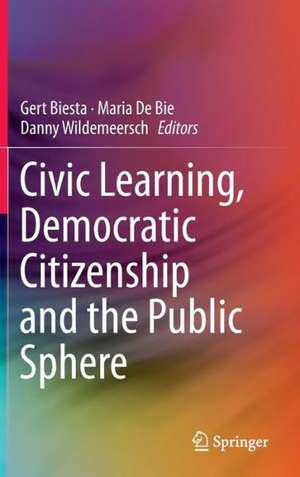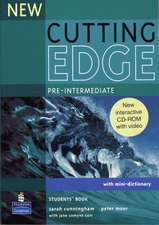Civic Learning, Democratic Citizenship and the Public Sphere
Editat de Gert Biesta, Maria De Bie, Danny Wildemeerschen Limba Engleză Hardback – 18 oct 2013
| Toate formatele și edițiile | Preț | Express |
|---|---|---|
| Paperback (1) | 637.46 lei 6-8 săpt. | |
| SPRINGER NETHERLANDS – 23 aug 2016 | 637.46 lei 6-8 săpt. | |
| Hardback (1) | 643.65 lei 6-8 săpt. | |
| SPRINGER NETHERLANDS – 18 oct 2013 | 643.65 lei 6-8 săpt. |
Preț: 643.65 lei
Preț vechi: 757.24 lei
-15% Nou
Puncte Express: 965
Preț estimativ în valută:
123.17€ • 131.70$ • 102.69£
123.17€ • 131.70$ • 102.69£
Carte tipărită la comandă
Livrare economică 18 aprilie-02 mai
Preluare comenzi: 021 569.72.76
Specificații
ISBN-13: 9789400772588
ISBN-10: 9400772580
Pagini: 214
Ilustrații: XX, 214 p. 1 illus.
Dimensiuni: 155 x 235 x 20 mm
Greutate: 0.51 kg
Ediția:2014
Editura: SPRINGER NETHERLANDS
Colecția Springer
Locul publicării:Dordrecht, Netherlands
ISBN-10: 9400772580
Pagini: 214
Ilustrații: XX, 214 p. 1 illus.
Dimensiuni: 155 x 235 x 20 mm
Greutate: 0.51 kg
Ediția:2014
Editura: SPRINGER NETHERLANDS
Colecția Springer
Locul publicării:Dordrecht, Netherlands
Public țintă
ResearchCuprins
Introduction: Civic learning, democratic citizenship and the public sphere; Gert Biesta, Maria De Bie and Danny Wildemeersch.- 1. Learning in public places; Gert Biesta.- SECTION 1: THEORY.- 2. Displacing concepts of social learning and democratic citizenship; Danny Wildemeersch.- 3. Social services and their educational mandate in the modern nation state; Walter Lorenz.- 4. Learning Democracy in Social Work; Maria Bouverne-De Bie, Rudi Roose, Filip Coussée and Lieve Bradt.- 5. Subjectificating socialization for the common good: The case for a democratic offensive in upbringing and education; Micha de Winter.- SECTION 2: METHODOLOGY.- 6. Mapping children’s presence in the neighbourhood; Sven De Visscher.- 7. Research as response: Methodological reflections; Carmen Mathijssen and Danny Wildemeersch.- 8. Action research and democracy; Rudi Roose, Maria Bouverne-De Bie and Griet Roets.- 9. Educational research on community building practices: From evaluation to witnessing; Peter Reyskens and Joke Vandenabeele.- SECTION 3: RESEARCH.- 10. When the wrong people speak. On bullying as a political problem for democratisation in schools; Carl Anders Säfström.- 11. Democratic experimentation in early childhood education; Michel Vandenbroeck and Jan Peeters.- 12. Disturbing pedagogies in Special Youth Care; Karel De Vos.- 13. Theorizing underlying notions of citizenship in the dynamics of learning in public policy units; Griet Roets and Rudi Roose.- 14. Education and sustainability issues: an analysis of publics-in-the-making; Katrien Van Poeck and Joke Vandenabeele. Index.
Textul de pe ultima copertă
This books explores the relationships between learning, democratic citizenship and the public sphere from thee interconnected angles: theory, methodology and research. The main message of the book is that civic learning necessarily has a public character, as it is learning that emerges from engagement in democratic processes and practices that occur both at the centre and the margins of society. Through a combination of theoretical development, methodological reflection and empirical case study, the chapters in the book provide new insights in the complexities of learning in the context of the ongoing struggle for democracy.
Caracteristici
Explores the interconnections between learning, democratic citizenship and the public sphere Approaches democracy as an ongoing public experiment Uses a consistent framework to make theoretical, methodological and empirical contributions Explores the democratic potential of social work practices ?





